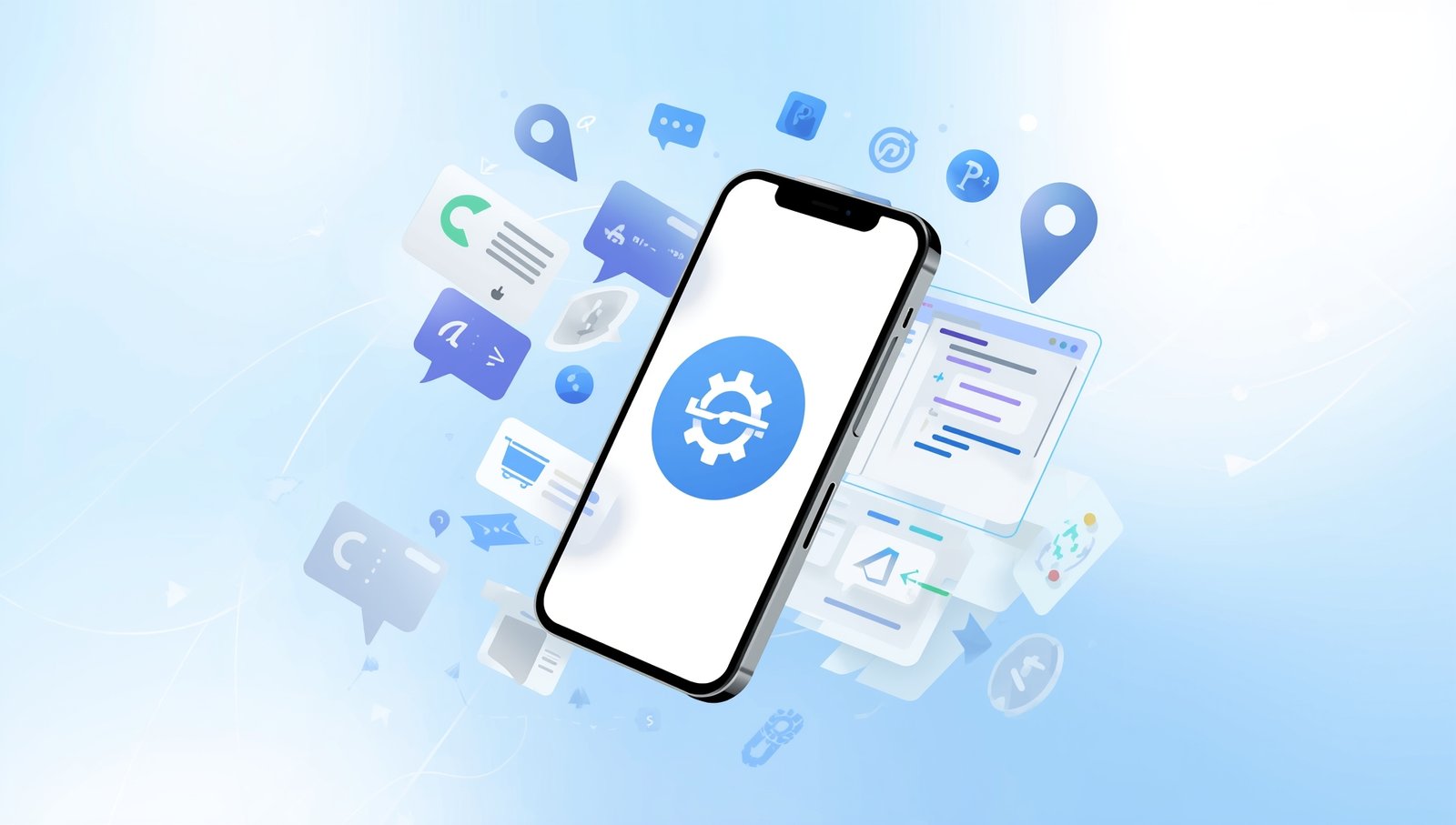Introduction
In today’s fast-moving digital world, mobile app development has become a big part of our lives. It refers to the process of creating software applications that run on mobile devices like smartphones and tablets.
From WhatsApp to Instagram and Uber, mobile apps are everywhere. They help people connect, shop, learn, and travel easily. This is why businesses and developers are focusing more on creating smart and useful mobile apps.
2. What is Mobile App Development?
Mobile app development is the process of designing and building software applications for mobile devices. For instance, these apps can be used for many different purposes. People use them for chatting, shopping, booking rides, and also watching videos.
Unlike web development, which focuses on websites, mobile app development deals with apps that run directly on mobile operating systems like Android or iOS.
3. Types of Mobile Apps
There are three main types of mobile apps:
| Type | Description | Pros | Cons |
|---|---|---|---|
| Native | Built for a specific platform like Android or iOS using platform languages. | Fast performance, smooth UI | Expensive, separate code for each OS |
| Hybrid | A mix of native and web apps, using one codebase for all platforms. | Cost-effective, faster to build | Slower than native, less flexible |
| Web Apps | Mobile-friendly websites accessed through a browser (e.g., Progressive Web Apps) | Easy to update, no app store need | Limited access to device features |
Each type has its strengths and weaknesses, depending on what the app needs to do.
4. Popular Mobile Platforms
The two most popular mobile platforms are:
- Android: Powered by Google and used by brands like Samsung, Xiaomi, and more.
- iOS: Developed by Apple and used only on iPhones and iPads.
For development, Android uses Android Studio, while iOS uses Xcode. These tools help developers write, test, and build their apps.
5. Key Stages in Mobile App Development
Creating a mobile app involves several important steps:
- Idea and Planning – Decide what the app will do and who will use it.
- UI/UX Design – Design the look and feel of the app to ensure it’s easy to use.
- Development – Write the code for the app’s frontend (user side) and backend (server side).
- Testing – Check for bugs and errors.
- Deployment – Launch the app in the App Store or Google Play Store.
- Maintenance and Updates – Fix issues and add new features over time.
Each stage is important for creating a successful app.
6. Tools and Technologies Used
Developers use different languages and tools based on the platform:
- Languages:
- Java, Kotlin (for Android)
- Swift (for iOS)
- Dart (for Flutter framework)
- Frameworks:
- React Native, Flutter, and Xamarin – These allow building apps for both Android and iOS using one codebase.
- Databases and APIs:
- Apps use databases like Firebase, SQLite, or MongoDB to store data.
- APIs help apps connect with other services, like maps or payment gateways.
7. Cost and Time Factors
Several things affect the cost and timeline of mobile app development:
- Complexity of the app
- Number of features
- Platforms (Android, iOS, or both)
- Design quality
You can develop an app in-house (your team) or outsource it to an agency. Outsourcing may be cheaper, but it requires good communication. In-house gives more control but can be costly.
8. Challenges in Mobile App Development
App development isn’t always easy. Here are some common challenges:
- Device Compatibility – Apps must work well on different screen sizes and models.
- Performance Optimization – Apps should run fast and use less battery.
- App Store Approval – Apple and Google have strict rules. Apps must follow them to get published.
9. Why Mobile App Development is Important for Businesses
For businesses, mobile apps bring many benefits:
- Better Customer Engagement – Apps allow users to connect with the brand directly.
- Increased Visibility – A mobile app keeps the brand in front of users every day.
- Monetization – Apps can earn money through ads, in-app purchases, or subscriptions.
10. Future Trends in Mobile App Development
Mobile apps are getting smarter and more advanced. Here are some exciting trends:

- AI & Machine Learning – Apps can learn user behavior and give smart suggestions.
- 5G Technology – Faster internet will improve app speed and features.
- AR/VR Applications – Augmented and virtual reality apps are being used in games, shopping, and
- education.
11. Frequently Asked Questions (FAQ)
1. What is meant by mobile app development?
Mobile app development means creating software applications that run on mobile devices like smartphones and tablets. These apps are built using different programming languages and tools for platforms like Android or iOS.
2. Is mobile app development easy?
Mobile app development can be easy or difficult, depending on the type of app and your skill level. With the help of modern tools and online tutorials, beginners can start learning, but building complex apps may still require experience and practice.
3. How do I develop mobile apps?
To develop mobile apps, you need to learn a programming language (like Kotlin or Swift), choose a development tool (like Flutter or Android Studio), design your app, write and test the code, and publish it to app stores.
4. What type of skill is needed for a mobile app developer?
You need to know how to code, understand design, and be able to solve problems. Also, you should learn how to use APIs and work with databases. Testing and fixing bugs are also important.
5. What do you mean by mobile development?
Mobile development means creating applications that are made to work on mobile devices. This includes writing code, designing interfaces, testing the app, and launching it for public use.
6. How do I become a mobile developer?
To become a mobile developer, you can follow these steps:
- Learn mobile programming languages (Java, Kotlin, Swift, etc.)
- Practice using tools like Android Studio or Xcode
- Build simple projects to learn
- Take online courses or certifications
- Build a portfolio to show your work
- Apply for internships or freelance jobs
7. Is mobile development easy to learn?
Yes, with time and effort, mobile development is easy to learn, especially if you start with beginner-friendly tools like Flutter or React Native. Many free resources are available to help you step by step.
8. Is C++ used for mobile development?
Yes, C++ is used in mobile development, especially for performance-heavy apps, such as games or apps with complex graphics. However, it’s less common than Kotlin, Java, Swift, or Dart, which are easier for general app development.
9. How do I start a career in mobile development?
Start by learning a mobile programming language. Then, build small projects to practice. You can also take online courses. After that, create a portfolio and apply for jobs or freelance work.”
12. Conclusion
In short, mobile app development is a growing field with huge potential. From planning to launch and beyond, every step matters in building a successful app.
As technology improves, mobile apps will become even more powerful. Whether for business or personal use, investing in mobile app development is a smart move for the future.







Add comment